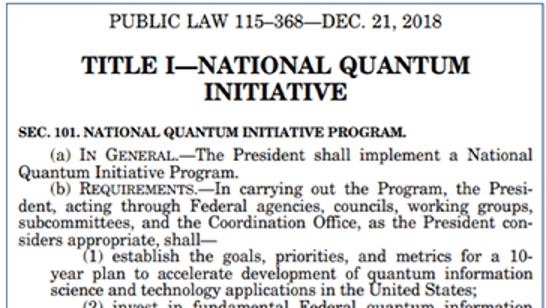10 Things to Know About Quantum Computing
Every year, breakthroughs occur in quantum computing that could transform medicine, create ultra-secure encryptions, revolutionize communications, and advance artificial intelligence-enabled technologies. The benefits of quantum computers are expansive, and innovation to realize them requires industry, research, and government support.
Share
Read Next
-
The National Quantum Initiative (NQI) Act became law in 2018, accelerating government quantum research and development for economic and national security purposes. It directs multiple agencies, including NSF, DOD, NIST, DOE, LPS, NASA, and IARPA, to engage in the initiative. More information is available at Quantum.gov.
-
In 2020 the NQI Act established the Quantum Economic Development Consortium (QED-C). This included member businesses small and large representing different parts of the US supply chain and government bodies, including NIST and the Department of Energy. Together these members will lay the groundwork for a commercial industry based on quantum computing.
-
By 2025, an estimated 463 exabytes of data will be created each day globally. Because quantum computers can make multiple calculations simultaneously, the technology will help speed up data analysis using less energy. The technology may also be more successful at training machine learning processes to optimize artificial intelligence.
-
At the World Economic Forum’s Global Technology Governance Summit, stakeholders discussed how quantum computers provide insights into the causes of climate change to help identify and mitigate these impacts.
-
Quantum computing can also transform significant parts of our daily lives. For instance, the distribution and consumption of utilities like energy and water could be optimized using quantum calculations. Renovations to power grids, for example, will reduce costs and waste in the energy sector.
-
Quantum theory is not a new concept to chemists; Fritz London and Walter Heitler first applied quantum mechanics to the theory of chemical bonding in the early 20th century. Quantum computing, however, is much less studied. Some scientists believe models of chemical systems can change how chemistry is studied and medicines are discovered.
-
Unlocking powerful quantum computers can lead to significant technological advancements, but it can also have serious ramifications, such as new abilities to break advanced encryptions. Many online activities, including banking, email, and government documents storage, are protected through encryptions. The technology could crack the code of large volumes of sensitive data, potentially creating a national security risk.
-
NIST is developing a post-quantum cryptography standard to migrate encryption algorithms to quantum-resistant algorithms, so sensitive or private information in the private and public sector is secured online against malicious actors.
-
Semiconductor chips are crucial to the central processing unit of a quantum computer. Various technologies in different industries also use this technology, making the demand for semiconductor chips higher than the supply. The chip shortage is driving the need for domestic manufacturing capabilities.

Support Research Like This
With your support, BPC can continue to fund important research like this by combining the best ideas from both parties to promote health, security, and opportunity for all Americans.
Give NowRelated Articles
Join Our Mailing List
BPC drives principled and politically viable policy solutions through the power of rigorous analysis, painstaking negotiation, and aggressive advocacy.